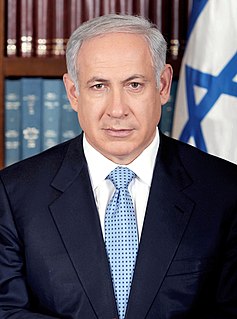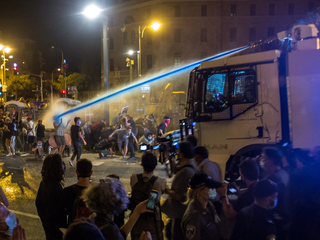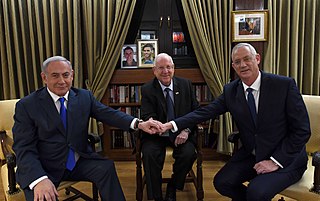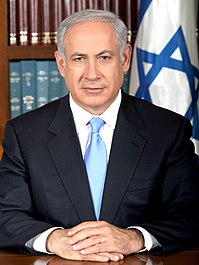 W
WBenjamin Netanyahu is an Israeli politician who served as the ninth prime minister of Israel from 1996 to 1999 and from 2009 to 2021. Netanyahu currently serves as Leader of the Opposition and as the chairman of the Likud – National Liberal Movement. He served in office for a total of 15 years, making him the longest-serving Israeli prime minister in history. He was also the first prime minister to be born in Israel after its Declaration of Independence.
 W
WGeneral elections were held in Israel on 29 May 1996. For the first time, the prime minister was elected on a separate ballot from the remaining members of the Knesset.
 W
WEarly general elections for both the Prime Minister and the Knesset were held in Israel on 17 May 1999 following a vote of no confidence in the government; the incumbent Likud Prime Minister Benjamin Netanyahu, ran for re-election.
 W
WElections for the 18th Knesset were held in Israel on 10 February 2009. These elections became necessary due to the resignation of Prime Minister Ehud Olmert as leader of the Kadima party, and the failure of his successor, Tzipi Livni, to form a coalition government. Had Olmert remained in office or had Livni formed a coalition government, the elections would have been scheduled for 2010 instead.
 W
WAn election for the leadership of Likud was held on 31 January 2012.
 W
WThe 2014 Gaza War, also known as Operation Protective Edge was a military operation launched by Israel on 8 July 2014 in the Hamas-ruled Gaza Strip. Following the kidnapping and murder of three Israeli teenagers by Hamas members, the IDF conducted Operation Brother's Keeper to arrest militant leaders, Hamas fired rockets into Israel and a seven-week conflict broke out. It was one of the deadliest conflicts between the Palestinians and Israel in decades. The combined Israeli airstrikes and ground bombardment and Palestinian rocket attacks resulted in thousands of deaths, the vast majority of which were Gazans.
 W
WA leadership election was held by the Likud party on 31 December 2014. It was won by incumbent Prime Minister and leader of Likud Benjamin Netanyahu.
 W
WEarly elections for the twentieth Knesset were held in Israel on 17 March 2015. Disagreements within the governing coalition, particularly over the budget and a "Jewish state" proposal, led to the dissolution of the government in December 2014. The Labor Party and Hatnuah formed a coalition, called Zionist Union, with the hope of defeating the Likud party, which had led the previous governing coalition along with Yisrael Beiteinu, Yesh Atid, The Jewish Home, and Hatnuah.
 W
WA leadership election was held by the Likud party on 26 December 2019. Incumbent Benjamin Netanyahu defeated Gideon Sa'ar by a large majority.
 W
WThe 2019–2021 Israeli political crisis was a period of political instability in the State of Israel, in which four Knesset snap elections were held in a span of two years: in April 2019, September 2019, March 2020 and March 2021. The popular phrasing of the core division within the political parties was: "Only Bibi or only not Bibi.". This stalemate was created due to the refusal of the liberal wing of the parliament to form a coalition with Netanyahu while the Likud party – the prominent party of the conservative wing – refused to remove Netanyahu from the party's leadership. The rest of the conservative wing parties refused to "betray" him. None of the wings were able to form a coalition by themselves due to the tie-breaking parliament seats held by the Arab parties. Some parliament members from Jewish parties and Arab parties considered the possibility of governmental cooperation to be out of the question.
 W
WThe Abraham Accords are a joint statement between State of Israel, the United Arab Emirates, and the United States of America, reached on August 13, 2020. Subsequently, the term was used to refer collectively to agreements between Israel and the United Arab Emirates and Bahrain, respectively.
 W
WThe Bahrain–Israel normalization agreement, officially Abraham Accords: Declaration of Peace, Cooperation, and Constructive Diplomatic and Friendly Relations is an agreement to normalize diplomatic and other relations between Bahrain and Israel. The agreement was announced by President Donald Trump on September 11, 2020, and followed on from a joint statement, officially referred to as the Abraham Accords, by the United States, Israel and the United Arab Emirates (UAE) on August 13, 2020. It was formally signed on September 15, 2020, at the White House in Washington, D.C., and made Bahrain the fourth Arab state to recognize Israel and the second within a month.
 W
WThe Israel–Morocco normalization agreement is an agreement announced by the United States government on December 10, 2020, in which Israel and Morocco agreed to begin normalizing relations. On December 22, 2020, a joint declaration was signed pledging to quickly begin direct flights, promote economic cooperation, reopen liaison offices and move toward "full diplomatic, peaceful and friendly relations." Morocco officially recognized Israel in its communication to Israeli Prime Minister Benjamin Netanyahu.
 W
WThe Israel–United Arab Emirates normalization agreement, officially the Abraham Accords Peace Agreement: Treaty of Peace, Diplomatic Relations and Full Normalization Between the United Arab Emirates and the State of Israel, was initially agreed to in a joint statement by the United States, Israel and the United Arab Emirates (UAE) on August 13, 2020, officially referred to as the Abraham Accords. The UAE thus became the third Arab country, after Egypt in 1979 and Jordan in 1994, to agree to formally normalize its relationship with Israel, as well as the first Persian Gulf country to do so. Concurrently, Israel agreed to suspend plans for annexing parts of the West Bank. The agreement normalized what had long been informal but robust foreign relations between the two countries. The agreement was signed at the White House on September 15, 2020. It was approved unanimously by the Israeli cabinet on October 12 and was ratified by the Knesset on October 15. The UAE parliament and cabinet ratified the agreement on October 19.
 W
WThis is the list of international prime ministerial trips made by Benjamin Netanyahu as Prime Minister of Israel.
 W
WProtests against Benjamin Netanyahu, the former Prime Minister of Israel, gained prominence in Israel during the COVID-19 pandemic and the ongoing trial of Netanyahu for various corruption scandals. Protesters accused Netanyahu of subjecting the law, as part of his fight in the criminal proceedings against him. The demonstrators protested against Netanyahu's continued tenure in the shadow of his criminal charges, claims of his preference for personal good over the good of the state, and demands to investigate the "submarine affair". One of the hotspots most identified with the protests was the compound near the Prime Minister's Residence, on Balfour Street in Jerusalem. The protests concluded after the thirty-sixth government of Israel, headed by Naftali Bennett and Yair Lapid in a power-sharing agreement, was sworn in on 13 June 2021, ending Netanyahu's 12-year second tenure as prime minister.
 W
WThe thirty-fifth government of Israel, or the Netanyahu–Gantz government, was the government of Israel which was sworn in on 17 May 2020 and dissolved on 13 June 2021.
 W
WThe Thirty-second government of Israel, also known as the Second Netanyahu Government, was the largest cabinet in the country's history, in terms of the number of ministers: initially containing 30 ministers and nine deputy ministers, it later added another deputy prime minister as of May 2012 until he resigned in July 2012.
 W
WThe thirty-third government of Israel, also known as the third Netanyahu government, was formed after the 22 January 2013 Knesset elections, took office on 18 March 2013, and served until 14 May 2015. The Prime Minister was Benjamin Netanyahu of Likud; the government was a coalition of Likud, Yisrael Beiteinu, Yesh Atid, The Jewish Home, and Hatnuah.
 W
WDuring the fourth and fifth governments of Israeli Prime Minister Benjamin Netanyahu, a number of corruption scandals that allegedly directly involved Netanyahu and his close political allies had been investigated. The Israel Police began investigating Netanyahu starting in December 2016. As a result of their investigation, police recommended indictments against Netanyahu. Additionally, on 21 November 2019, Netanyahu was officially indicted for breach of trust, accepting bribes, and fraud. As a result of the indictment, Netanyahu is legally required to relinquish his ministry portfolios other than prime minister. Netanyahu's trial in the Jerusalem District Court began on 24 May 2020. Witness testimony began on 5 April 2021.
 W
WThe twenty-seventh government of Israel was formed by Benjamin Netanyahu of Likud on 18 June 1996. Although his Likud-Gesher-Tzomet alliance won fewer seats that the Labor Party, Netanyahu formed the government after winning the country's first ever direct election for Prime Minister, narrowly defeating incumbent Shimon Peres. This government was the first formed by an Israeli national born in the state after independence in 1948.